Mar 29, 2018
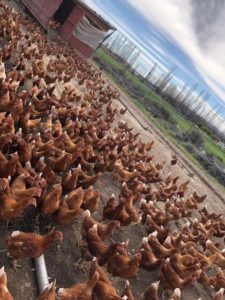
By Elena Karoulina, Executive Director
It’s a crisp, breezy morning in March, and I am walking the fields of the Eatwell Farm with the farm manager, Cameron Ottens. It’s a fascinating place – I fell under its spell from the first minutes I saw the earth-sheltered farmhouse with a living green roof and walls.
Many fields are planted with cover crop, nurturing soil, getting ready for the busy summer season. Multi-colored chard, kale and many sorts of cabbages fill the rest of the fields that look like an impressionist painting, with all shades of green and some bright accent colors. Chickens are housed in the mobile coops; they are regularly moved to different locations throughout the farm leaving behind cleaned and fertilized areas. Fruit trees in the nearby orchard are beginning to flower, showing off a pastel-hued rainbow of petals against blue spring sky.
As I am listening to Cameron talking about soil, farm operation, plants, CSA, sustainable farming, local food system, I am reminded again and again about the complexity of the art we call agriculture. Cameron often exclaims: “There is so much to learn!”. The work and learning in the farm are endless….
Eatwell farm was founded by the late Nigel Walker, a leading figure in the Bay Area organic food movement. Beginning with 65 acres near Dixon in 1997, the farm has grown to 105, all organic acres growing hundreds of varieties of fruits and vegetables to ensure a year-round, diverse supply of the best produce for their Community Supported Agriculture (CSA) members. Each weekly box comes with recipes and a newsletter from the farm.
CSA members are often invited to the farm for the members-only events like Strawberry Days (You Pick Them), Lavender Harvest and Summer Solstice. You can even have a sleepover on the farm!
There are numerous CSA pick-up locations throughout the Bay Area, including Vallejo, Fairfield and Vacaville in Solano County. There is a waiting list for Benicia too – if you are interested, please contact the farm!
What makes this farm so special is their Care Share Program. Eatwell Farm provides boxes of fresh, organic produce to people who are truly in need of super nutrition, including community members undergoing intense medical treatment. One of the Sustainable Solano partners, Mission Solano, a transitional house for homeless people of Solano County, receives boxes of fresh produce weekly from this generous program.
Just like every holistic, family-owned farm serving local communities, this farm needs all the support from us! Please consider joining Eatwell Community Supported Agriculture program. You will be rewarded by a weekly box of fresh, nutrient-dense organic produce and eggs. To find out more and to sign up: https://www.eatwell.com
P.S. If you would like to hear the founder, Nigel Walker, talk about his farming philosophy beginning with healthy soils – the approach that is still the foundation stone of the farm – watch this video:
https://www.youtube.com/watch?v=oa9ORY_VXKg
Cameron Ottens, Eatwell Farm manager, will be a part of the post-movie panel discussion, “The Economics of Happiness”, showing in Vallejo on Saturday, March 31 (link). Hope to see you there!
Mar 27, 2018
By Stephanie Oelsligle Jordan, Local Food Project Manager
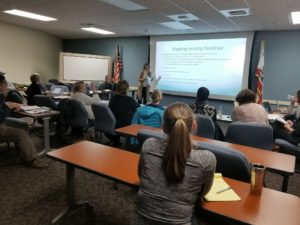 Sustainable Solano is nearing completion of Phase 1 of its “Solano Community Food Centers” project, funded by a USDA Local Food Promotion Program planning grant. The Food Centers are intended to be small-scale, consumer-driven food hubs (including both processed food and raw ingredients), sourced by local farmers, and located in each of Solano County’s seven cities.
Sustainable Solano is nearing completion of Phase 1 of its “Solano Community Food Centers” project, funded by a USDA Local Food Promotion Program planning grant. The Food Centers are intended to be small-scale, consumer-driven food hubs (including both processed food and raw ingredients), sourced by local farmers, and located in each of Solano County’s seven cities.
In Phase 1, we began conducting a feasibility study to determine the supply of local food in the county, the demand for local food among consumers, and explore ways to distribute this food to the people who want/need it. The project’s Working Group also analyzed past studies and literature relevant to the project, and began connecting with other regional organizations who are doing similar work in the areas of food systems and sustainability. The project’s Advisory Board met on Thursday, March 1, 2018, where findings to date were presented by the Working Group.
What we have found is that Solano County has a wealth of agriculture, but no organized “local food system.” Before we get into the findings and data, let’s define what a “local food system” is, within the context of this project. By “local”, we mean food that is both produced and consumed within Solano County. A functioning “food system” would refer to farms and ranches earning income through either direct-to-consumer sales, or intermediary marketing channels like schools, grocers, food hubs and the like. Furthermore, the system as a whole would strengthen Solano County’s rural economy and the environment while at the same time providing access to food (regardless of income/economic status), and nutrition education.
Data from 2015 shows that farm production in Solano County is around $354 million, and Solano County products are exported to 44 countries. Agriculture creates 4,709 jobs in the County, which accounts for 1.1% of the population. A 2017 study titled “Economic Effect of Agriculture in Solano County” confirmed that Solano has a thriving food manufacturing industry but nearly all of its raw materials come from elsewhere, and most raw agricultural products leave the county for processing. The USDA Agricultural Census of 2012 tells us that there are 860 total farms in Solano County, with 70% of them reporting sales under $50,000. Nearly half of the County’s farms report sales under $10,000.
So, that means Solano County has several smaller farms which might be interested in direct-to-consumer sales. (These are the folks we are looking for!) One requirement of the USDA grant is to ultimately increase access to – and consumption of – local food. After consulting with a variety of County-based organizations, we have identified around 40 small / mid-sized farms in Solano who use sustainable agriculture practices, and who may be interested in partnering with us on the project. We need more data directly from the farms to estimate sales volumes; this is one of the goals for the second stage of the project.
On the “demand” side of things, we focused on gathering demographic information about Solano County, and also statistics in food purchasing. Our population of 440,207 people is racially diverse (30% White, 26% Hispanic, 16% Asian, 15% African American, and 4% Other), 50% female, and nearly one-quarter of the population commutes to work outside of their homes in Solano. We estimated that Solano County residents spend around $1 billion annually on food, with only $2.1 million (0.2%) of those sales going toward Solano-grown products. About 33% of Solano County has a household income of over $100K, and 26% has an income of under $35K. There are 113,805 people who are eligible to receive food assistance (SNAP/CalFresh/EBT). Data from the Ecology Center in Berkeley showed that $52K per year of EBT and Market Match funds are spent at four different farmer’s markets within the County. However, when taking into consideration that the total amount of available food assistance funding per year is around $170 million, we should certainly expand ways in which residents could channel these funds into local food purchases.
One idea to explore is “Import Substitution.” In other words, we’d like to substitute non-local food purchases (i.e. purchases at chain grocery stores) with purchases of food grown by Solano County farmers. If we could replace just 1% of the County’s total food spending, it would keep $10 million within the County’s agriculture system. Likewise, if applying this same method to food assistance money, 1% of the total funding would generate $1.7 million in the County. These two sales strategies combined would make $11.7 million available for local farmers (vs. their current estimated $2 million in sales).
Phase 2 of the project (March-June, 2018) includes an exploration of HOW we might accomplish this, as well as the completion of two other objectives: 1) complete a study of relevant, successful business models of local food systems and local food enterprises (Sierra Harvest, Ceres Community Project, Three Stone Hearth, Fresh Approach, etc.), and 2) collect primary data from Solano County’s farmers, via a survey and meetings, so we have a very clear picture of the available supply, opportunities, and barriers to success. Phase 2 will also include developing a business plan, and then outlining implementation for our next steps, which may be beyond the USDA grant.
As we have delved into this research, major themes have emerged. We need a systemic, holistic look at Solano County’s Local Food System, and how this system might benefit key stakeholders: farmers, distributors, processors and community members of all socio-economic backgrounds. A good local food system should be viable economically (affordable farmland, decent wages, profitability for farms, several outlets for affordable local food), environmentally (healthy soil, safe pesticide use, clean water, reduced food miles) and socially (local food access for everyone, informed consumers, diverse farmers, healthy communities). Public education on not only the nutritional value of local food, but also the holistic picture will be key. To create a vision, there will need to be cooperation and dialogue across various stakeholders, agencies and community representatives across the County. Finally, when it comes to implementation, we will need a managing agent, the capacity to build out the system, and funding. We are exploring the idea of a Solano County Local Food Summit to begin bringing all these elements together.
Any questions or comments about the project may be directed to Stephanie Oelsligle Jordan at: Stephanie@SustainableSolano.org / 773.960.8061 (mobile).
Solano Local Food System Alliance Emerging Vision (Public Document)
Mar 26, 2018
by: Kimberly K. Fu
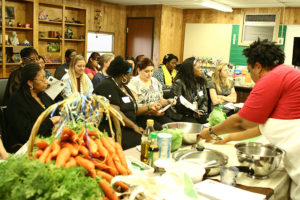
Image from www.sustainablefoodcenter.org
[Click here for The Reporter full article link]
Sustainable Solano is all about getting locally-grown food to local people.
Thanks to a grant from the United States Department of Agriculture (USDA), the nonprofit can move forward with the project.
On a recent day the group’s executive director, Elena Karoulina, and Stephanie Oelsligle Jordan, project manager and chef, shared insight into their ideas.
“We’ve been working on this for a long time,” Karoulina advised. “It’s a lot of work.”
The goal is to create access points, aka community food centers, where residents can pick up produce boxes from local farms, buy eggs and dairy and meat and other edibles and take cooking, nutrition and other classes.
In this way, Karoulina said, local farmers can sell their food, residents can buy them and learn how to prepare them and everyone gains better health.
It’s been a process, Jordan said, to locate all the farmers and others in Solano who might be a part in community food centers. As well, finding locations for those centers has been daunting.
But the 15-month Local Food Promotion Program planning grant from the USDA awarded in September at least provides necessary funding to get Sustainable Solano’s feet wet.
The group has partnered with researchers at the University of California, Davis; Solano County Department of Agriculture; and the Department of Public Health. On the agenda is a feasibility study, business plan and how to make a go of the food centers.
Engagement is a huge part of the project. To that end, Solano County Supervisors John Vasquez and Erin Hannigan have been instrumental in the project, Karoulina said, as have numerous other individuals and group.
Community talks are in the works.
Sought is input, lots and lots of input, on what people need and want and hope for. What locations would be great for a community center and is there a best time for such a facility to be open?
All thoughts will be taken under advisement, both women assured.
The study is set to be finalized this month.
The business plan and an outline of the implementation plan should be finalized by December.
Feb 26, 2018
by: Elena Karoulina, Executive Director
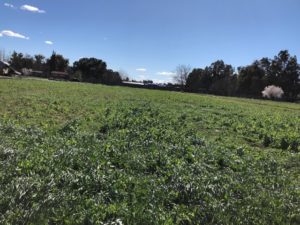
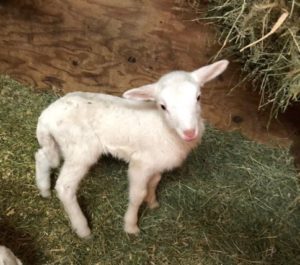
A couple weeks ago I had a great visit with Denise and Ben Lyons at their Lockewood Acres Farm in Vacaville. As a part of our work on the Solano Local Food System, I am getting to know local small farmers who are doing things right: they take care of the soil on their farms, plant diversified crop, pay special attention to the health of their water, strive for low-input farming (producing most of the fertility on the farm), and as a rule, look to work with nature, not against it, in harmonious, healing relationships with land, all living things and their communities.
Denise and Ben Lyons are this type of sustainable farmers. Their 10-acre beautiful, certified organic farm is located in the agricultural area between Vacaville and Dixon. When I came on a breezy & chilly February morning, both farmers were outside: Ben was fixing things around the barn, and Denise was wrapping up a meeting with Solano farmbudsman, Sarah Hawkins, going over rules and regulations governing various aspects of the farms’ operation. Even a small farm is a serious business, with its hard labor in the fields, barns and orchard, and different, but equally demanding work behind the scene: marketing, accounting, legal compliance, reporting… The work is endless and most of it is unseen by the community that gets to enjoy the fruits of this hard labor.
Most of the fields were resting for winter, covered by a green blanket of cover crop – fava beans, peas and other nitrogen-fixers. Before these plants go to seed, Ben will work this green manure into the fields, enriching and nurturing the soil, increasing its organic matter and improving water retention. This healthy soil will then feed the plants growing there that will eventually find their way to our kitchens and tables: tomatoes, cucumbers, eggplants, peppers, watermelons, salad greens, squashes, culinary herbs, and all sorts of root vegetables.
Fruit trees in the nearby orchard were also resting, waiting for the time when the sap will begin to flow, followed by beautiful fragrant flowers and then fruits. Apples, pears, all sorts of citrus, persimmons, plums, cherries, pomegranates, and figs – the list goes on and on of the bounty produced in this well-designed orchard. Olives are pressed in small batches in a local olive press – you can buy this olive oil directly from the farm.
Countless chickens were roaming the orchard, scratching the soil and adding natural fertilizers everywhere they went. Careful selection of heritage breeds provides for nutritious eggs in all possible colors: dark brown, light brown, blue, green, white.
In the small barns, there were dairy goats and hard-working sheep that regularly provide grass mowing services in the orchard, surrounded by adorable little ones constantly looking for milk and warmth. Keeping animals on the farm ensures a reliable source of manure, the traditional foundation of soil fertility, that decreases the demand for the outside input and supports this vibrant ecosystem called “Lockewood Acres Farm”.
An apiary completes the picture of the farm. Raw, delicious honey is available for sale year around.
Denise and Ben’ journey to this farm started with a discovery of the benefits of earthworms. Their original vision was to develop a homestead to nourish the immediate family. The vision eventually grew to include feeding the community! After the initial skepticism (mostly from Ben), the couple turned to organic farming, which Ben now describes as a “common-sense approach to farming”.
Would you like to join the community of the Lockewood Acres Farm well-nourished customers? This is what the Community Supported Agriculture stands for! Sign up to become a member of this farm’s CSA program. For more details, click here. If you are at the Vacaville Farmers Market on Saturdays, stop by the Lockewood Acres Farm stand and please say hi from their friends at Sustainable Solano!
There are multiple ways to participate and the farmers are flexible to work with you and your budget to provide nutrient dense, wholesome food for you and your family!
Feb 22, 2018
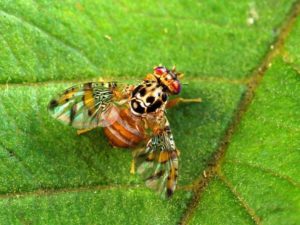
In case you haven’t heard, Solano County is the latest area to establish a quarantine for the Mediterranean fruit fly also known as the Medfly. The quarantine started last fall and will continue until officials are sure the threat to the local orchards and farms has passed. Commercial growers are most impacted by this quarantine, but homeowners with fruits and vegetables in their home gardens also need to be aware of the regulations and impact of this action.
For those wishing to gather more information, click here.
California Exotic Fruit Fly Project: Frequently Asked Questions Regarding Exotic Fruit Fly Quarantines
Feb 1, 2018
“The Juice House Co. Improving Health Through The Power of Food Energy”
By: Tiana Duvauchelle, Owner
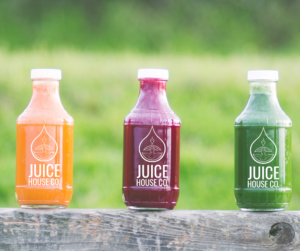
The Juice House Co. believes in the pursuit of positively impacting lives through the power of food energy. Together as a community, we unite as healthy beings through our offerings of Fresh, Raw, Organic Cold-Pressed Juice, Kombucha, Nut Mylks and Cold Brew Coffee.
I have shared my love of yoga at Yoga House Co. and to communities around the East Bay since 2012 and continue to, but in 2016 my sweet sister and I felt like we had more to give, more to share and more to offer to our local community; the dimension of FOOD YOGA. The journey of yoga begins with the physical body. The physical body “our food body” needs to be nourished. This body, consists of a material body built from the food we eat. With that as our forefront, we must feed our bodies with the most purest form of energy; organic fruits, veggies, nuts and grains. We built the Juice House Co. as a medium of offering food in its most purest form through my creative expression of love and devotion to all being everywhere.
Deep down, we all have the desire to eat healthy and be healthy, but we also live lives where we eat compulsively, away from home and so convenience it key. The Juice House Co. is here to offers this new flavor, with this new take on healthy indulgences
We work closely with our local, organic suppliers to create the best product with the best ingredients for our all favorite juice junkies. We strive to minimize waste through recycling/reusing bottles, to sharing our leftover compost with local growers, to upcycling our coffee grounds!
All Juice, Kombucha, Nut Mylks & Cold Brewed Coffee are locally sourced, pressed, bottled, and enjoyed! The Juice House Co. team is excited to share this food energy, this food yoga, one of the greatest wonders of life, pure raw energy given to us by Mother Earth.
Find us on First Street in Benicia for our fresh goods, friendly staff, great jams, good vibes and loving spirits….or order your goods online for pick up!


 Sustainable Solano is nearing completion of Phase 1 of its “Solano Community Food Centers” project, funded by a USDA Local Food Promotion Program planning grant. The Food Centers are intended to be small-scale, consumer-driven food hubs (including both processed food and raw ingredients), sourced by local farmers, and located in each of Solano County’s seven cities.
Sustainable Solano is nearing completion of Phase 1 of its “Solano Community Food Centers” project, funded by a USDA Local Food Promotion Program planning grant. The Food Centers are intended to be small-scale, consumer-driven food hubs (including both processed food and raw ingredients), sourced by local farmers, and located in each of Solano County’s seven cities.




